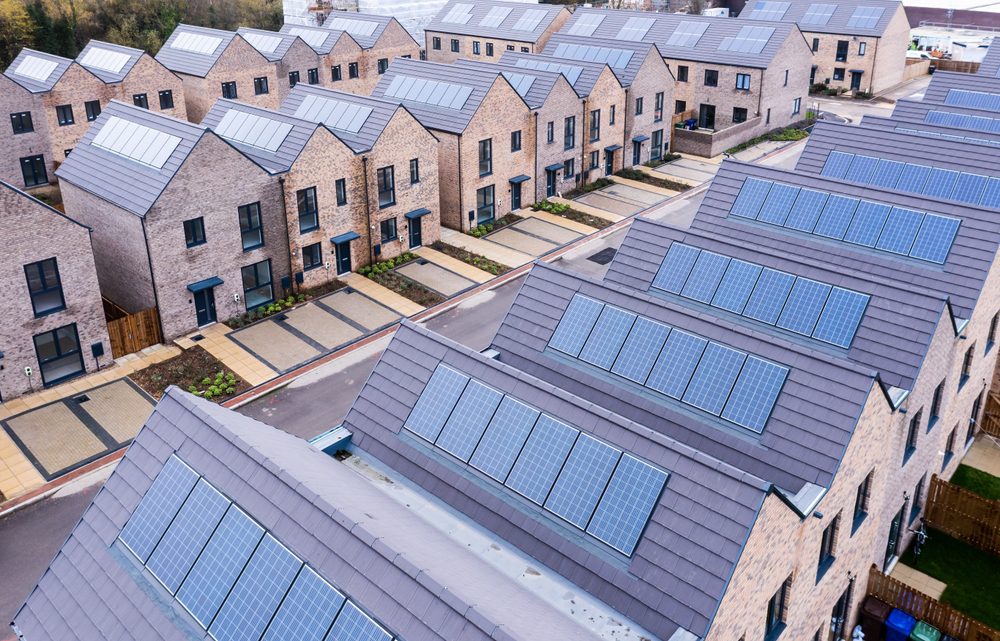The UK government is expected to announce that all new homes will be legally required to have solar panels installed on the roof by 2027.
Reported widely on 1 May, the move is being viewed as a rejection of Tony Blair’s intervention on net zero, in which he argued that “today’s policy strategies have become disconnected from political, public, and economic reality”.
The Guardian reported that it will add between £3,000 and £4,000 to the cost of building a home, according to estimates, but that this will yield more than £1,000 of annual savings on energy bills for homeowners (as earlier reported in The Times).
Often described as “an open goal”, the installation of rooftop solar is nonetheless not without caveats, with one of the biggest points of contention being the upfront cost. The three-year-payback period claimed for this policy echoes figures cited by solar trade associations and other groups.1 Elsewhere, the payback period for rooftop solar is said to be between 10-20 years, rather than three.2
Andy Mayer, Energy Analyst at the free market think tank the Institute of Economic Affairs, derided the policy as “an ideological crusade”, commenting: “If the Government’s claims about savings of £1,000 per household a year were credible, there would be no need for a mandate.
“Clearly, they are not. Average electricity bills for a typical household are £881, while industry experts consider the payback period for rooftop solar to be between 10-20 years not 3.
“Many properties entirely unsuited to benefit, given their orientation, proximity to tree cover, or latitude.
“Nor will this matter much to carbon targets. The UK typically adds 0.5% to the housing stock each year, a number that will fall if homes are made more expensive to build.
“The timing of this announcement in a week where 60 million Europeans experienced a catastrophic blackout event due to over-supply of solar on the Spanish grid shows extraordinary contempt.”
While other commentators were far more positive about the move, David Nicholl, Chairman of solar installer Butterfly, nonetheless pointed out that installation wasn’t the only cost, and that “installing panels is just the start — not the end — of the rooftop revolution.”
“Solar panels need ongoing servicing to ensure they operate at their best,” and this means that “homebuilders must offer dual assurance over panel efficiency and installation quality. It can’t be a fit and forget approach with this solar rollout.”
For example, he suggested as a requirement the provision of “24/7 remote monitoring and diagnostics to proactively identify issues.”
One group that has campaigned for rooftop solar panels to be made compulsory on new-build homes, the CPRE, greeted the expected policy announcement as “a big win”.
The group’s Roger Mortlock said: “The UK’s millions of roofs have the potential to generate huge amounts of cheap and sustainable energy, slash people’s bills and ensure we make the best use of our finite supply of land.
“Net zero is non-negotiable, with solar power a key part of our energy mix. We urge the government to set a target for generating at least 60% of the UK’s solar energy from rooftops.
“We’ve wasted the potential of our rooftops for too long, we still want to see rooftop solar rolled out across warehouses, car parks, and existing homes. At the same time, mega solar risks being allowed to damage natural landscapes and productive farmland. Today’s announcement helps restore the right balance.”
Notes
[1] The US Solar Energy Industries Association (SEIA) cites 5–8 year payback under favorable conditions.
[2] The International Energy Agency (IEA) report Renewables 2022 notes that payback is closer to 10–20 years, especially without subsidies. In the UK, consumer news outlet Which? has previously estimated the payback period as 15+ years, explaining that benefits depend on household electricity use and export tariffs.

















